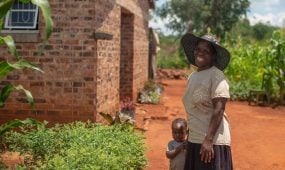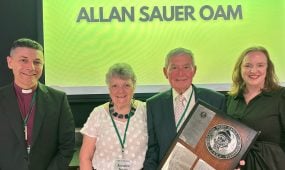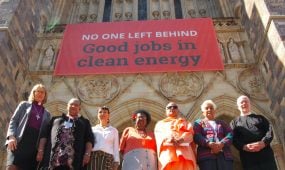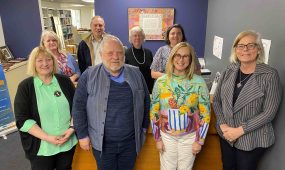Archbishop Jeremy echoes urgent call for 1.5 degree climate threshold after Torres Strait visit
National
Archbishop Jeremy has echoed the urgent call of Torres Strait Islander Traditional Owners to limit global average surface warming to 1.5 degrees Celsius above pre-industrial temperatures following his recent visit to Poruma and Masig Islands
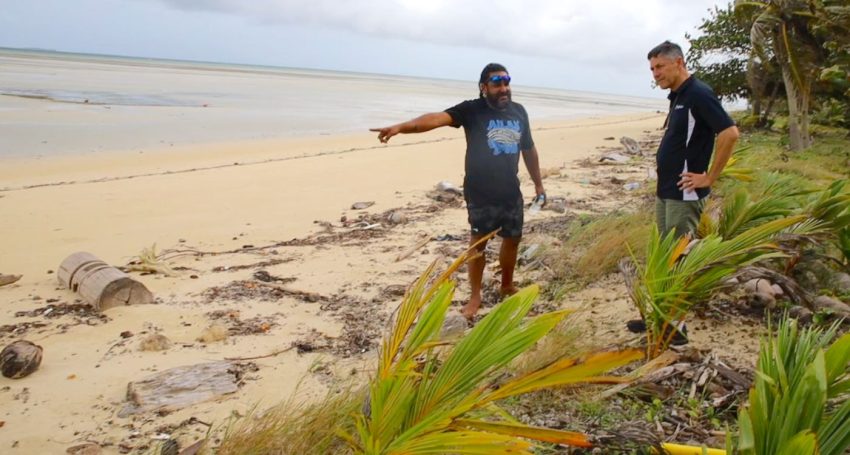
Archbishop Jeremy has echoed the urgent call of Torres Strait Islander Traditional Owners to limit global average surface warming to 1.5 degrees Celsius above pre-industrial temperatures following his recent visit to Poruma and Masig Islands.
The Most Reverend Jeremy Greaves, whose seven-day Torres Strait Islands tour ended last week, said that he was struck by the enormity and complexity of climate change’s impacts on low-lying islands.
“While sandbags and seawalls protect villages and communities, these are only a temporary fix,” Archbishop Jeremy said.
“It is also a ‘fix’ that has other impacts — a seawall that protects a village also prevents turtles from nesting and a boat ramp substantial enough to withstand the higher tides causes the movement of sand so that it covers seagrass and impacts dugong habitats.
“There is a sense of urgency that we miss ‘down south’ — along one Masig coastline three metres of beach have been lost in the last couple of years.
“People’s deep connection and sense of belonging to their land means they can’t conceive of leaving.
“Local people hold much wisdom about the tides, seas and changes to the seasons and say that this wisdom is often not taken into account when ‘solutions’ are developed and implemented.
“They feel forgotten by the rest of Australia and by government and ask that funding of amelioration projects involves greater consultation and that federal MPs visit.
“They see government money being spent in Kiribati and Tuvalu and, while not arguing about the urgency and necessity of supporting these island nations, they say they are not getting the same level of support from their government.
“After witnessing the complexity of the impacts first-hand, I echo the call for further commitments to reducing the burning of fossil fuels to limit warming to 1.5 degrees in line with the Paris Agreement, which Australia is party to.”
Torres Strait Island Regional Council Councillor Francis Pearson showed Archbishop Jeremy Greaves around Poruma, along with his (midwife) spouse Josie Greaves, senior Saibai elder Aunty Dr Rose Elu and Anglican Church Southern Queensland justice unit coordinator Peter Branjerdporn.
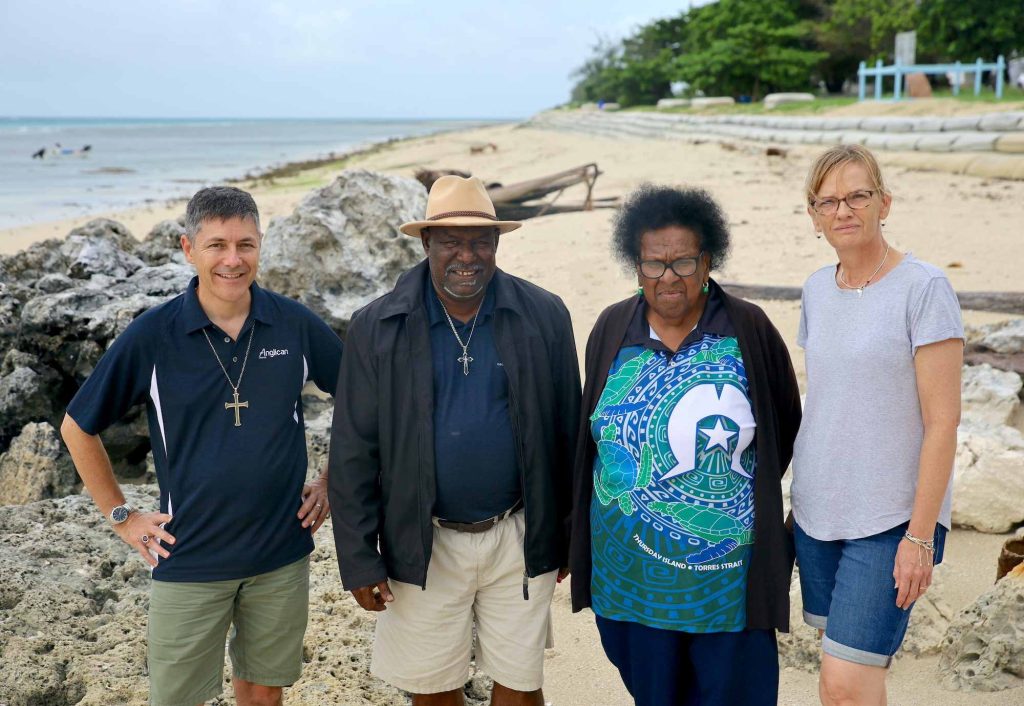
Archbishop Jeremy Greaves, Cr Francis Pearson, Aunty Dr Rose Elu and Josie Greaves on Poruma on Thursday 9 May 2024
The Brisbane-based visitors witnessed the hightide lapping the edges of Poruma’s town and the alarming levels of land erosion, as well as the ways committed locals are actively reducing their environmental footprint.
These measures include installing solar panels, keeping the very few vehicles well maintained, implementing a community containers collection program at the school and keeping the ocean rubbish free.
On Masig the visitors met with the Reverend Ned Mosby from St John the Evangelist Anglican Church, newly elected councillor Ted Mosby and climate advocate Yessie Mosby.
Advertisement
Yessie Mosby was one of the “Torres Strait Islander Eight” who made legal history after a 2022 United Nations Human Rights Committee landmark decision that found the Australian Government is violating its human rights obligations to them through climate change inaction.
Mr Mosby said that he invites other mainland leaders to follow the Archbishop’s example and visit the Torres Strait’s low-lying islands.
“Watching Archbishop Jeremy jump out of one of the Torres Strait Island’s smallest planes with Josie, Aunty Rose and Peter gave me hope and inspired me to fight more,” Mr Mosby said.
“I have Anglican family members — my grandmother was part of the Mothers Union and Father Ned Mosby is my athe, my grandfather’s younger brother.
“We’ve sent a lot of invitations to the federal government to visit our island and our invitations have been declined; however, the Archbishop made it his own business to come and stay on Masig and witness and face what we live every day.
“And he came with such humbleness, sitting with us and eating with us — I hold a deep respect for a person who will come and share a meal.
Advertisement
“Protecting our islands is about protecting the people, and the flora and fauna, including the marine life, land animals, insects, plant life, birds and so on.
“We need Australians to support the ‘Our Islands Our Home’ campaign and to contact their federal elected representatives calling them to keep warming to less than 1.5 degrees by keeping fossil fuels where they belong — in the ground — and by harnessing clean energy.
“We invite Prime Minister Anthony Albanese, Climate Change and Energy Minister Chris Bowen and Environment and Water Minister Tanya Plibersek to come and visit our islands, as Archbishop Jeremy did, and listen to us and witness the impacts of climate change.”
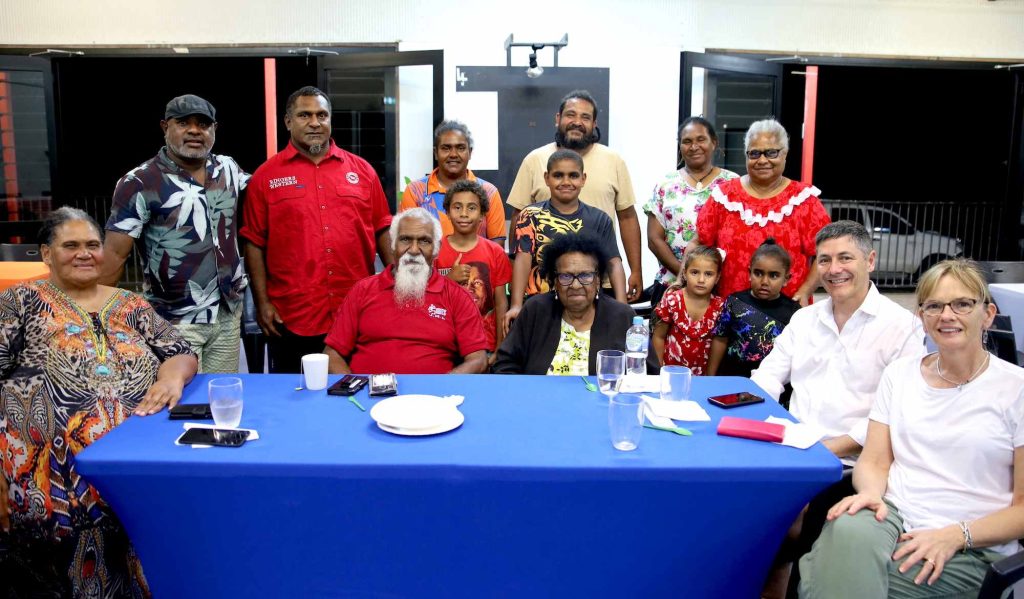
Masig community leaders and their families, including Yessie Mosby (third from right, standing) welcomed Aunty Dr Rose Elu, Archbishop Jeremy Greaves and midwife Josie Greaves at a dinner at Masig Community Hall on Friday 10 May 2024
Aunty Dr Rose is part of the seminal class action, led by Uncles Pabai Pabai and Paul Kabai, arguing that the Commonwealth owes a duty of care to Torres Strait Islander peoples to take reasonable steps to protect them from the harms caused by climate change.
Aunty Dr Rose assisted the legal team who argued that the court should require the Commonwealth to reduce greenhouse gas emissions to the 1.5-degree threshold.
The final hearings and closing arguments for the landmark case were held in Cairns the Friday before the Archbishop’s Wednesday 8 May arrival.
Aunty Dr Rose said that she was shocked by the level of shoreline erosion she witnessed during her visit.
“It’s been ages since I’ve been to Poruma and Masig, and it was distressing looking at how the islands have shrunk, where the shorelines have eroded, and how ancestral resting places have been washed away,” Aunty Dr Rose said.
“I observed in my spiritual and cultural way the Archbishop and Josie listening deeply and engaging in conversation with people and seeing them walking on the beach connecting with the ocean and the land.
“People were uplifted by his visit — I had a beautiful message from a senior elder from Masig that the Archbishop’s visit was a blessing for the island, and that his presence and walks on the shores strengthened the island.
“And, one of the aunties on Poruma made a beautiful remark about Josie saying that spending time sharing a meal with Josie is something they will never forget because of her humility and strength.”
Midwife Josie Greaves said that her understanding of the connection that Torres Strait Islander peoples have with the land and sea was deepened during her visit.
“I’ve worked with and lived with Aboriginal and Torres Strait Islander peoples and consider myself as someone striving to be an ally,” Josie said.
“I had some understanding of the difference of connection to Country for First Nations peoples, but visiting Masig changed that somewhat for me.
“Meeting Yessie and listening to the stories of his island home that reach back many generations — ‘before time’ — changed my understanding of First Nations peoples’ connection to their Country.
“He could point to coconut and oak trees, which have been uprooted and are now lying on the beach, that only a year ago his kids were playing under.
“Most confronting was the desecration of his ancestors’ resting places by climate change’s impacts.
“This was the moment that made me realise that his connection to home was strong in a way I could never really feel for any of the 24 homes I’ve lived in.
“This connection is what keeps him there, why he won’t leave or move without a fight, why he can’t leave.
“Yessie also shared with us the practice of burying the placentas of the baby boys born to families who live on Masig.
“Women must leave the island to birth their babies, travelling to Thursday Island, but return with their baby to Masig, burying the placenta and planting a coconut tree on top.
“As the coconut tree grows and bears fruit this signals a time for ceremony for the boy the placenta belonged to.
“As a midwife I am aware of the significance of the placenta — the work it does to support the growing baby — and I have some understanding that for First Nations people it is important, especially if birthing on Country is not available to them, as they can bring the placenta back to connect the child to Country.
“Yessie was unable to tell me if there is a similar practice for the female babies as this is not his knowledge to know or share.”
During his visit, Archbishop Jeremy also visited Waiben (Thursday Island) where he presided over a Sunday service and confirmed a parishioner at All Souls’ and St Bartholomew’s Anglican Church and met with the Reverend Ben Paton, parish councillors, Mothers Union members and Melanesian Brothers who are living on Thursday Island.
On Waiben the Archbishop spoke with Aunty Jen Enosa in a Radio 4MW interview about what he learnt from Traditional Owners.
He also met with Torres Strait Regional Authority Ranger Mentor Uncle Don Whap who said that climate change is causing extra stress for local young people who already face enough challenges.
The Archbishop’s 8 to 14 May tour was funded with the assistance of an Anglican Board of Mission grant in support of Aboriginal and Torres Strait Islander mission.
Editor’s note: Please visit the Our Islands Our Home website to find out how you can help Yessie, Aunty Dr Rose and other Torres Strait Islander friends.


